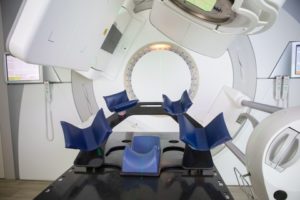Radiotherapy Outcomes in Mesothelioma Linked to Pembrolizumab
 Canadian researchers say radiotherapy may hold the key to improving outcomes in mesothelioma.
Canadian researchers say radiotherapy may hold the key to improving outcomes in mesothelioma.
Mesothelioma is a fast-growing membrane cancer caused by asbestos. Doctors have not found a single therapy that can beat it. For most patients, a combination of treatments offer the best survival odds.
Pembrolizumab plus Radiotherapy
Pleural mesothelioma is a rare lung-related cancer caused by asbestos exposure. There is no cure for mesothelioma. Most mesothelioma patients have a combination of therapies. Radiation is one of the methods doctors use to help slow its spread. Outcomes in mesothelioma vary widely with the use of radiotherapy.
Pembrolizumab is used in combination with chemotherapy as a first-line treatment for mesothelioma. Radiotherapy uses beams of intense energy to kill cancer cells. One advantage to radiotherapy is that it can sometimes produce an abscopal effect.
The abscopal effect is when doctors irradiate one tumor but other non-treated tumors also respond. The Canadian team wanted to develop a mesothelioma treatment that would capitalize on this effect.
Radiotherapy in Cancer Treatment
Radiotherapy can be a highly effective and integral component of cancer treatment. The abscopal effect has been rarely reported but is now received increasing attention. The combination of radiotherapy with the use of immunotherapy.
The abscopal effect has limited reporting in mesothelioma outcomes. It is more commonly seen in melanoma and non-small cell lung cancer. University of British Columbia scientists present a case of the abscopal effect. This patient was also treated with pembrolizumab chemotherapy.
This approach to immuno-radiotherapy for mesothelioma triggered the abscopal effect. It took a few rounds of radiation for this to kick in. The study could make radiotherapy treatments a regular addition to immunotherapy and pembrolizumab.
Outcomes in Mesothelioma
Dr. Rebekah Rittberg from the University of British Columbia concludes, “Historically, it was believed that radiotherapy only impacted tissue within the targeted field. However, increasing clinical and experimental data demonstrates that it also impacts the tumor microenvironment.”
This case report illustrates the presumed abscopal effect in malignant mesothelioma. There is an increasing consensus that this treatment may result in improved local disease control. This method will also lower the patient’s total doses of radiotherapy reducing toxicity.
Ongoing clinical trials are evaluating the abscopal effect in mesothelioma outcomes. Malignant mesothelioma continues to need ongoing research and exploration into treatment optimization.
Source
Rittberg, R., Chan, E., Yip, S., Alex, D., & Ho, C. (2022). Radiation Induced Abscopal Effect in a Patient With Malignant Pleural Mesothelioma on Pembrolizumab. Cureus, 14(2). https://www.cureus.com/articles/84354-radiation-induced-abscopal-effect-in-a-patient-with-malignant-pleural-mesothelioma-on-pembrolizumab





